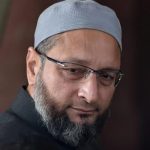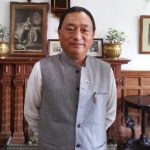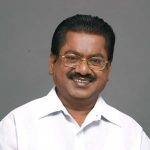Live projects for policymakers promise to be the most exciting component of the Policy in Action Program. For this edition of the program, fellows supported the work of the following policymakers:
 Mr. Asaduddin Owaisi is the President of the All India Majlis-e-Ittehadul Muslimeen and a four-time Member of Parliament (MP) representing the Hyderabad constituency in Lok Sabha. Previously, he was twice elected to the Andhra Pradesh Legislative Assembly during the 1994 and 1999 elections from the Charminar constituency.
Mr. Asaduddin Owaisi is the President of the All India Majlis-e-Ittehadul Muslimeen and a four-time Member of Parliament (MP) representing the Hyderabad constituency in Lok Sabha. Previously, he was twice elected to the Andhra Pradesh Legislative Assembly during the 1994 and 1999 elections from the Charminar constituency.
Mr. Owaisi did his BA from Nizam College. He is a barrister by profession and studied at Lincoln’s Inn of London. Besides being a Member of Parliament, he is also the chairman of Dar-us-Salam Board and is the founder member of the All India Muslim Personal Law Board, New Delhi. He is also the Chairman of Hyderabad-based Owaisi Hospital and Research Centre. The hospital functions in the field of Medical Education, Research and Medical care.
In Parliament, Mr. Owaisi sits on the Standing Committee for Science & Technology, Environment & Forests. He is a vocal advocate for the rights of minorities.
 Mr. Vaishnaw is a Member of Parliament representing the State of Odisha in Rajya Sabha. He is a member of the Bharatiya Janata Party.
Mr. Vaishnaw is a Member of Parliament representing the State of Odisha in Rajya Sabha. He is a member of the Bharatiya Janata Party.
He graduated from the Jai Narayan Vyas University, Rajasthan in 1992 with a gold medal in electronic and communications engineering and then completed his M.Tech from IIT Kanpur, before cracking the IAS in 1994. In 2008, Mr. Vaishnaw pursued an MBA from the Wharton School at the University of Pennsylvania.
In Parliament, he is a member of multiple committees. He sits on the Science and Technology, Environment, Forests and Climate Change committee. He is also a member of the Consultative Committee for the Ministry of Information and Broadcasting, as well as the committee on Surrogacy (Regulation) Bill, 2019 and the Joint Committee on the Personal Data Protection Bill, 2019.
 Mr. Ering is a Member of the Legislative Assembly from the Pasighat West constituency in the East Siang district of Arunachal Pradesh. Until recently, he represented Arunachal in the Lok Sabha. He was also the Union Minister of State for Minority Affairs in the UPA government. He is a member of the Indian National Congress.
Mr. Ering is a Member of the Legislative Assembly from the Pasighat West constituency in the East Siang district of Arunachal Pradesh. Until recently, he represented Arunachal in the Lok Sabha. He was also the Union Minister of State for Minority Affairs in the UPA government. He is a member of the Indian National Congress.
He began his political career as a member of the Arunachal Pradesh Legislative Assembly in 1989, where he served two terms. He has also served as a Minister of State in the Government of Arunachal Pradesh and as the Deputy Speaker of the Arunachal Pradesh Legislative Assembly.
While in Parliament, he was a member of the Committee on Ethics, the Standing Committee on Science & Technology, and the Standing Committee on Environment & Forests. He has also been associated with not-for-profits working in the sphere of health and sanitation.
 Mr. Rahul Shewale is a Shiv Sena MP who represents the Mumbai South Central constituency in the Lok Sabha. He is currently a member of the Committee on Public Accounts in the Parliament.
Mr. Rahul Shewale is a Shiv Sena MP who represents the Mumbai South Central constituency in the Lok Sabha. He is currently a member of the Committee on Public Accounts in the Parliament.
In the previous Lok Sabha, he was a member of the Standing Committee on Urban Development, member of the Consultative Committee, Ministry of Chemicals and Fertilisers as well as member of the Railway Convention Committee.
He has served several terms as a corporator in the BMC (Municipal Corporation of Mumbai) where he worked closely on issues affecting the city, including infrastructure, urban poverty and grievance redressal. He is a four-time chairman of the influential standing committee of the BMC. He studied civil engineering from the Government Polytechnic, Bandra.
 Prof. M V Rajeev Gowda was elected to Rajya Sabha in July 2014 from the state of Karnataka. He is a national spokesperson for the Indian National Congress. He was Professor of Economics and Social Sciences and the Chairperson of the Centre for Public Policy at the Indian Institute of Management (IIM), Bengaluru and taught a range of courses. He has served as a Director of the Central Board, Reserve Bank of India.
Prof. M V Rajeev Gowda was elected to Rajya Sabha in July 2014 from the state of Karnataka. He is a national spokesperson for the Indian National Congress. He was Professor of Economics and Social Sciences and the Chairperson of the Centre for Public Policy at the Indian Institute of Management (IIM), Bengaluru and taught a range of courses. He has served as a Director of the Central Board, Reserve Bank of India.
Prof. Gowda studied economics and political science at St. Joseph's College where he was elected as the Vice-President of the Student Union in 1982–83. He was awarded the Bangalore University gold medal in political science and secured a fully funded scholarship to pursue Masters in Economics at Fordham University, New York. Prof. Gowda holds a PhD in Public Policy & Management from Wharton School, University of Pennsylvania. He was also a Post-Doctoral Fellow in Law & Economics from University of Berkeley, California.
Prof. Gowda leads ‘Bengaluru Needs You’ (BNY), a citizen movement to involve and empower people to engage with civic authorities to bring positive transformation in the city of Bengaluru.
 Colonel Rajyavardhan Singh Rathore has been elected for a second term in the Lok Sabha from the Jaipur (Rural) constituency. He has previously served as the Minister of State (Independent Charge) of the Ministry of Youth Affairs and Sports and the Ministry of Information and Broadcasting in the Narendra Modi government.
Colonel Rajyavardhan Singh Rathore has been elected for a second term in the Lok Sabha from the Jaipur (Rural) constituency. He has previously served as the Minister of State (Independent Charge) of the Ministry of Youth Affairs and Sports and the Ministry of Information and Broadcasting in the Narendra Modi government.
Col. Rathore served in the Indian Army and is a former Olympic shooter. He has been the recipient of the Padma Shri, the ‘Ati Vishisth Seva’ Medal, the Arjuna Award and the Khel Ratna.
In Parliament, he sits on the Committee on Estimates and the Committee on Information Technology. Previously, he has also been a member of the Standing Committee on Defence.
 Mr. Elangovan is a Member of Parliament (Rajya Sabha) from Tamil Nadu. He is also the Organisation Secretary of the Dravida Munnetra Kazhagam party (DMK). He holds a Masters in English Literature from the University of Madras, Chennai.
Mr. Elangovan is a Member of Parliament (Rajya Sabha) from Tamil Nadu. He is also the Organisation Secretary of the Dravida Munnetra Kazhagam party (DMK). He holds a Masters in English Literature from the University of Madras, Chennai.
Mr. Elagovan has been a part of the Committee on External Affairs, Committee on Empowerment of Women, Committee on Chemicals and Fertilizers and the Consultative Committee, Ministry of Railways in the past. His interests include working for the oppressed classes and striving for social justice.
He has previously been a member of the 15th Lok Sabha from 2009 to 2014 from the Chennai North constituency.
Live Projects
During the course of the program, teams of 4-6 fellows each are assigned to work on policy issues for the participating policymakers. You’ll find below a list of the specific issues that the teams worked on during this edition of the program.
- Study the tax structures applicable to domestic and foreign manufacturing businesses in Vietnam, Indonesia, and Malaysia, and compare them with the Indian tax structure.
- Identify the tax breaks/ benefits received by businesses in these countries over similar benefits in India (if any), with the intention of identifying reasons why foreign manufacturing businesses prefer to set up in other South Asian countries over India.
- Through secondary research and stakeholder consultations, understand if there are other reasons apart from tax structures, such as policy certainty, infrastructure etc. that make the other destinations more appealing.
- Basis the above analysis, and keeping in mind best practices from across the globe, prepare a set of recommendations that can be made to the government to make India more appealing to foreign manufacturing businesses.
- Review the DNA Technology (Use and Application) Regulation Bill, 2018 to identify potential roadblocks in its applicability and implementation;
- Identify and review judicial precedents on DNA fingerprinting in India and analyse the trajectory of use of DNA technology in the country.
- Using stakeholder interactions and by surveying secondary sources, identify best practices for the use and regulation of DNA technology in other countries and analyse the possibility of applying these learnings in the Indian context.
- Basis the above analysis, prepare actionable recommendations on how the Bill can be drafted more effectively.
- Through a mapping exercise, identify and analyse government programs, policies and schemes (both central and state) that incentivise and support self help groups (SHGs) in Rajasthan.
- Specifically, analyse and evaluate the performance of SHG bank linkage programs and their impact. Also, explore the supply side of credit in terms of incentives for bankers to seek SHG portfolios.
- Based on the above analysis, make actionable recommendations to the government. Suggest bank reforms and alternative credit linkage interventions to ensure credit deepening in SHGs.
- Using literature review, stakeholder consultations and other available data, analyse the PM-Kisan scheme. How has the scheme fared in implementation? What challenges has the government faced?
- Map the benefits offered under PM-Kisan vis-a-vis other support/ incentives/ subsidies available to small and marginal farmers in India. To what extent does PM-Kisan help improve a farmer’s financial situation?
- Examine international best practices to bolster agricultural income in similar contexts. Assess the viability of implementing some of these initiatives in India.
- Suggest actionable recommendations basis the aforementioned analysis, to augment farmer income as well as to improve the implementation of PM-Kisan.
- Study the history of the inner line permit (ILP) for Arunachal Pradesh, exploring the need for such a permit and its evolution over the years.
- Through stakeholder consultations and literature review, evaluate the effectiveness of the ILP in protecting the identity and rights of indigenous people of the state, as well as their access to public services such as health, education etc. Assess the viability of implementing such a provision in other states.
- Do similar provisions exist in other countries? Undertake a comparative analysis to understand the execution of such provisions elsewhere.
- Basis the above analysis, make suitable recommendations to the government.
- Study the problem of honour crimes in India. Is the problem prevalent more in some parts of the country than others? Map the occurrence of honour killings by state each year, over the last 10 years. Comment on the accuracy of the data available as well as any patterns that emerge from the analysis.
- Identify gaps in existing policies or laws for combating honour crimes in India.
- Identify best practices from countries around the world and prepare a set of policy recommendations that can be proposed to address the problem.
- Given the geographical location of Mumbai, study the potential effects of climate change on the city, specifically its impact on the economy, environment, health and migration of people.
- Identify and evaluate steps taken by the government - central, state and local - in combating the effects of climate change. Delve deeper into the role played by the local government in Mumbai.
- Study best practices by local governments from other cities both in India and around the world to mitigate climate change concerns in their respective cities. Assess the viability of implementing some of these initiatives in the context of Mumbai, given its size and governance construct.
- Basis the above, prepare actionable recommendations for the municipal authorities.
- Undertake an analysis of the migration patterns in Mumbai over the past 10 years.
- Given the levels of migration, study the real estate market in Mumbai and analyse the impact of migration on this market.
- Basis research and stakeholder consultations, evaluate the need for land ownership and other housing reforms to cater to the needs of the growing population. Consider looking at international best practices to support your arguments. What challenges do you anticipate?
- Prepare a set of actionable recommendations based on the above.
- Scan the landscape of promising behavioural nudges globally and the initiatives undertaken by governments to systematically include insights from behavioural economics in policy design. How effective have such initiatives been?
- Study key government programs/ initatives to understand if and how they can be redesigned to improve outcomes using behavioural nudges.
- In particular, analyse the existing policy interventions in relation to Menstrual Hygiene Management (MHM) in India and identify potential areas for influencing behavioural patterns towards sustainable and safe MHM practices.
- In relation to stubble burning in North India, specifically Haryana, identify the existing framework that is proposed for addressing the issue. Analyse whether there is a role for nudges to influence the behaviour of farmers and other stakeholders in this context.
- Study the National Education Policy 2019 and identify the possibility of leveraging nudges in improving outcomes with respect to school education.
- Analyse the following aspects of the Personal Data Protection Bill, 2019: (i) the ownership of personal data; (ii) the treatment of non-personal data; (iii) the right to be forgotten; and (iv) consent requirements.
- Compare these aspects of the Bill with data protection laws in other countries, especially the EU, Australia and Singapore.
- Analyse the data localisation provisions under the Bill. Using secondary research and stakeholder consultations, identify the required infrastructure for data localisation, the cost of such infrastructure and the potential impact these requirements are likely to have on companies.
- Basis the above analysis, prepare a set of recommendations to balance the interests of the three key stakeholders - consumers, the government and businesses.
- Undertake an analysis of the transfer of resources between the center and states over the course of the last decade. Study the changes recommended by the previous (14th Finance Commission), and their impact on state finances.
- Investigate how tax devolution to states has evolved with the implementation of the GST regime. In particular, analyse how it has impacted resource-generation in states, and whether it has contributed to inter-state inequality.
- In the light of the above, and basis secondary research and stakeholder consultations with academics and experts, consider if there is a need to tweak the center-state financing formulae to better address the needs of states. Make suitable policy recommendations accordingly.
- Examine the changing face of Indian agriculture over the last decade. Investigate the impact of economic/ industrial development on indicators such as agricultural practices, crop yield, farm livelihoods and food security.
- Critically analyse existing laws and schemes at the national and state level that seek to protect agricultural land and improve agrarian yield.
- Survey international best practices and in particular, explore the implementations of Special Agricultural Zones (SAZs) and Globally Important Agricultural Heritage Systems (GIAHS) around the world.
- Basis the above, consider the viability of creating protected agricultural zones in India. Draft a Private Members’ Resolution to raise the issue in Parliament.
Class profile
Educational background